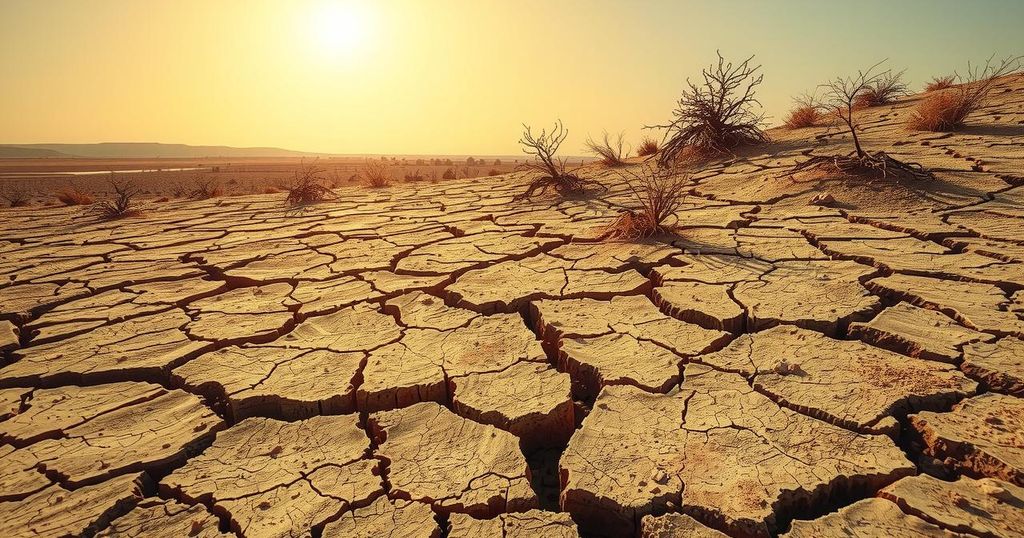2024: A Year of Alarming Climate Change Records and Consequences
The WMO’s 2024 State of the Climate report reveals alarming trends in climate change, highlighting a likely first occurrence of global temperatures exceeding 1.5°C above pre-industrial averages, with greenhouse gas levels at their highest in 800,000 years. The report documents numerous extreme weather events linked to climate change and emphasizes the urgent need for a transition to clean energy to combat these rising challenges.
Climate change presents an unparalleled challenge for humanity in the 21st century, necessitating urgent scrutiny of how environmental conditions are evolving. The World Meteorological Organization’s (WMO) recent State of the Climate report indicates alarming records for 2024, citing this year as likely the first to exceed 1.5°C above pre-industrial average temperatures. Furthermore, greenhouse gas concentrations reached unprecedented levels, marking the highest in the last 800,000 years.
The report highlights dire implications associated with ongoing climate change, linking it to numerous natural disasters. Notably, Hurricane Helene wreaked havoc across the southeastern United States, while severe flooding occurred in Africa’s Sahel region. Addressing these escalating challenges calls for an immediate transition from fossil fuels to sustainable energy sources.
In examining the climate trends documented in 2024, it is noted that global average temperatures reflect a continuous increase due to greenhouse gas emissions. This year marked the warmest since the initiation of comprehensive global record-keeping 175 years ago, with an estimated rise of 1.55°C compared to the period from 1850 to 1900. The temperature increase between record years further illustrates this alarming trend.
Key contributors to the temperature spike include an El Niño event, diminishing pollution from marine shipping, and heightened solar activity. Researchers are analyzing the specific reasons behind these record temperatures, firmly linking the situation to anthropogenic climate impacts that would not have otherwise occurred.
Various environmental indicators are also reaching unprecedented levels. Atmospheric carbon dioxide concentrations reached 427 parts per million, while sea levels ascended to heights 11 centimeters above early 1990s data. Also, seasonal sea ice saw notable reductions, and glacial melting persisted at an unprecedented pace, intensifying ocean acidification.
Extreme weather patterns continue to dominate headlines, particularly in North America, Europe, and Australia, yet similar occurrences in Africa and South America remain largely unreported. In 2024, catastrophic events included Super Typhoon Yagi in the Philippines and Cyclone Chido in Mozambique, causing mass casualties and displacement. Regions such as the arid Sahel and Sahara faced unusual flooding, contrasted by severe drought afflicting southern Africa and the Amazon’s tributaries.
The report serves as a critical reflection of humanity’s long-standing disregard for climate science. Despite over a century of understanding concerning greenhouse gas-driven warming—even as emissions rise—our responses remain insufficient. To avert further catastrophic climate repercussions, it is imperative to curtail fossil fuel dependence and achieve net-zero emissions effectively.
In summary, the WMO’s 2024 State of the Climate report underscores the severe realities of climate change, revealing unprecedented temperature rises and extreme weather events linked to anthropogenic activity. The report highlights the urgent need for a transition to cleaner energy solutions to mitigate these escalating climate challenges. As global temperatures continue to exceed critical thresholds, the scope for effective action diminishes, emphasizing that every fraction of a degree of warming can have dire consequences. The time for decisive action towards sustainability is now, as the repercussions of inaction will only worsen in the future.
Original Source: eveningreport.nz




Post Comment